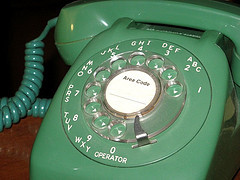When The Lights Go Out, You Might Be Stuck Without A Landline

(Enokson)
Now that telephone and cable companies have increasingly moved away from using the old tried and true copper lines to provide landline service, you might find yourself without a phone in a power outage. Our seriously smart siblings at Consumer Reports looked into the drawbacks of landline fiber optic and VoIP telephone systems.
During a power outage, the newer systems aren’t able to maintain landline phone service indefinitely like the old copper lines can. Today’s systems usually provide around eight hours of standby service, says Consumer Reports, and then only if they happen to have an in-home battery backup.
That means if cell phone lines also fail, no dialing out for emergency supplies of cheese or letting your mom know you’re okay and have plenty of bottled water, or more importantly, no 911.
Even as many companies switch to VoIP and fiber systems that keep the copper lines next to the new lines, customers aren’t always aware they can opt for the traditional service.
Consumer Reports found that companies like Verizon, AT&T and others include warnings to consumers in their terms of service, which entails that the customer knows that in cases of service disruptions or power outages, they know they will not be able to place or receive calls to 911.
One reason copper may be falling out of popularity with phone companies — federal law requires them to share copper lines with competitors, but there is no such rule for fiber.
For more info on the pros and cons of copper lines, and whether you should ask your provider about using them, check out ConsumerReports.org.
Surprise! Your high-tech home phone system could go dead in an emergency [Consumer Reports]
Want more consumer news? Visit our parent organization, Consumer Reports, for the latest on scams, recalls, and other consumer issues.

